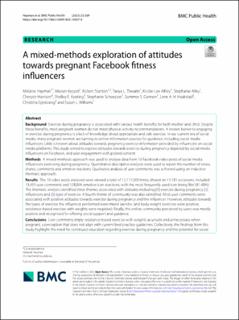A mixed-methods exploration of attitudes towards pregnant Facebook fitness influencers
Hayman, Melanie; Keppel, Marian; Stanton, Robert; Thwaite, Tanya L.; Alfrey, Kristie-Lee; Alley, Stephanie; Harrison, Cheryce; Schoeppe, Stephanie; Haakstad, Lene Annette Hagen; Gjestvang, Christina; Keating, Shelley E.; Cannon, Summer S.; Williams, Susan L.
Peer reviewed, Journal article
Published version

Permanent lenke
https://hdl.handle.net/11250/3096116Utgivelsesdato
2023Metadata
Vis full innførselSamlinger
- Artikler / Articles [2119]
- Publikasjoner fra Cristin [1107]
Sammendrag
Background: Exercise during pregnancy is associated with various health benefits for both mother and child. Despite these benefits, most pregnant women do not meet physical activity recommendations. A known barrier to engaging in exercise during pregnancy is a lack of knowledge about appropriate and safe exercise. In our current era of social media, many pregnant women are turning to online information sources for guidance, including social media influencers. Little is known about attitudes towards pregnancy exercise information provided by influencers on social media platforms. This study aimed to explore attitudes towards exercise during pregnancy depicted by social media influencers on Facebook, and user engagement with posted content.
Methods: A mixed-methods approach was used to analyse data from 10 Facebook video posts of social media influencers exercising during pregnancy. Quantitative descriptive analyses were used to report the number of views, shares, comments and emotive reactions. Qualitative analysis of user comments was achieved using an inductive thematic approach.
Results: The 10 video posts analysed were viewed a total of 12,117,200 times, shared on 11,181 occasions, included 13,455 user comments and 128,804 emotive icon reactions, with the most frequently used icon being ‘like’ (81.48%). The thematic analysis identified three themes associated with attitudes including [1] exercise during pregnancy [2] influencers and [3] type of exercise. A fourth theme of community was also identified. Most user comments were associated with positive attitudes towards exercise during pregnancy and the influencer. However, attitudes towards the types of exercise the influencer performed were mixed (aerobic and body weight exercises were positive; resistance-based exercise with weights were negative). Finally, the online community perceived by users was mostly positive and recognised for offering social support and guidance.
Conclusions: User comments imply resistance-based exercise with weights as unsafe and unnecessary when pregnant, a perception that does not align with current best practice guidelines. Collectively, the findings from this study highlight the need for continued education regarding exercise during pregnancy and the potential for social media influencers to disseminate evidence-based material to pregnant women who are highly receptive to, and in need of reliable health information.
Beskrivelse
This article is licensed under a Creative Commons Attribution 4.0 International License, which permits use, sharing, adaptation, distribution and reproduction in any medium or format, as long as you give appropriate credit to the original author(s) and the source, provide a link to the Creative Commons licence, and indicate if changes were made. The images or other third party material in this article are included in the article’s Creative Commons licence, unless indicated otherwise in a credit line to the material. If material is not included in the article’s Creative Commons licence and your intended use is not permitted by statutory regulation or exceeds the permitted use, you will need to obtain permission directly from the copyright holder.